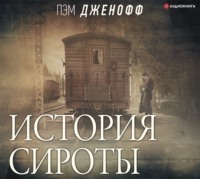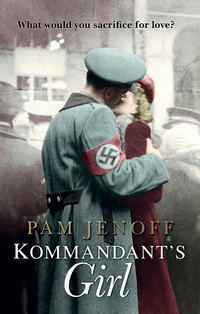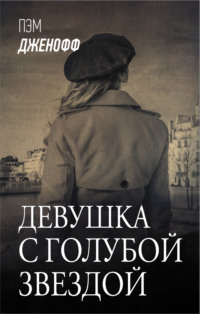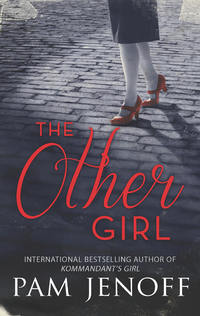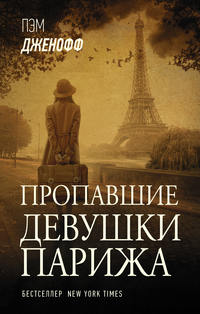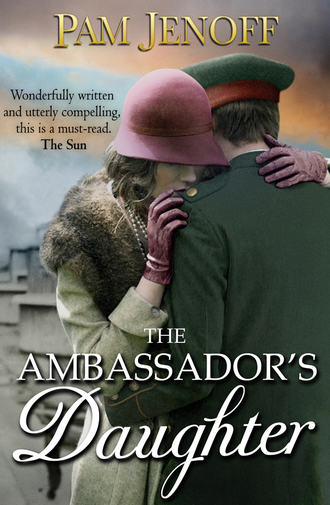
Полная версия
The Ambassador's Daughter

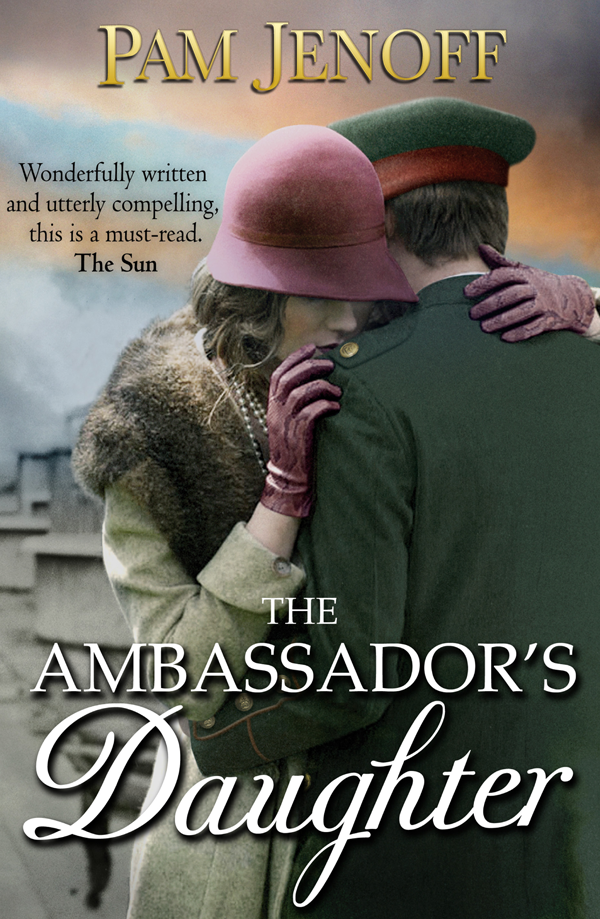
Praise for the author
Quill Award Nominee
‘This is historical romance at its finest.’
—Publishers Weekly on Kommandant’s Girl
‘In her moving first novel, Jenoff offers an insightful portrait of people forced into an untenable situation and succeeds in humanizing the unfathomable as well as the heroic.’
—Booklist
‘Poignant and intense’
—Good Book Guide on The Diplomat’s Wife
‘Jenoff explores the immediate aftermath of World War II with sensitivity and compassion, shedding light on an often overlooked era of European history. She expertly draws out the tension and illustrates the danger and poverty of Eastern Europe as it falls under communism. Highly recommended for all fiction collections.’
—Library Journal on The Diplomat’s Wife
‘… well constructed and a real page turner.’
—Birmingham Jewish Weekly on The Diplomat’s Wife
About the Author
PAM JENOFF is the author of several novels, including the international bestseller Kommandant’s Girl, which also earned her a Quill Award nomination. Along with a bachelor degree in International Affairs from George Washington University and Master’s degree in History from Cambridge, she received her Juris Doctor from the University of Pennsylvania and previously served as a Foreign Service Officer for the US State Department in Europe, as the Special Assistant to the Secretary of the Army at the Pentagon and as a practising attorney. Pam lives with her husband and three children near Philadelphia where, in addition to writing, she teaches law school.
Also by Pam Jenoff
KOMMANDANT’S GIRL
THE DIPLOMAT’S WIFE
The
Ambassador’s Daughter
Pam Jenoff

In loving memory of Dad
Acknowledgments
The Ambassador’s Daughter represents joy on so many levels to me. First, it gave me the chance to return to some of my beloved characters and themes from Kommandant’s Girl, something that I—and many of my readers—have been hoping would happen for several years. It also allowed me to explore Europe after the First World War, an era that has fascinated me since I wrote about it in my thesis at Cambridge nearly two decades ago. Writing a story in this era required extensive research about historical events as well as the social and political climate at the time. As always when writing historical fiction, I had to make some judgment calls about when to remain historically accurate and when to “bend” history, melding fact and fiction for the sake of story (a creative indulgence for which I hope my readers will forgive me).
This book brought me back to the incomparable publishing team at HQ, including my wonderful editor, Susan Swinwood, and the many brilliant folks in editorial, marketing, publicity and sales, and Kim Young and the marvelous team at HQ. I am so grateful for your time and talents, and overjoyed to be working with you again! Big thanks as always to my agents Scott Hoffman and Michelle Brower at Folio Literary Management for all of your keen insight and tireless work on my behalf. Thanks also to my colleagues at Rutgers for your interest and support.
Even as it is joyous, writing this book has been bittersweet. When I began The Ambassador’s Daughter, a book that examines among other things the parent-child relationship, I had no idea that my own beloved father would not be here to see the finished project. With each book I always recognize the “village” that makes my writing life possible. However, this time I need to express even more deeply my gratitude for those closest to me: my husband, Phillip, mother, Marsha, brother, Jay, as well as my in-laws Ann and Wayne, dear friends, and of course, the three little muses who sustain and inspire me every day, Benjamin, Charlotte and Elizabeth. I love you all.
PROLOGUE
The sun has dropped low beneath the crumbling arches of Lehrter Bahnhof as I make my way across the station. A sharp, late-autumn breeze sends the pigeons fluttering from the rafters and I draw my coat closer against the chill. The crowds are sparse this Tuesday evening, the platforms bereft of the usual commuter trains and their disembarking passengers. A lone carriage sits on the track farthest to the right, silent and dark.
I had been surprised by the telegram announcing Stefan’s return by rail. There were hardly any trains since the Allies had bombed the lines. At least that’s what the newspapers write—the defunct trains and the British naval blockade are the excuses given for everything, from the lack of new pipes to start the water running again—a problem that has forced us back outside as though it were a century ago—to the impossibility of getting fresh milk. Looking around the desolate station now, I almost believe the excuse.
Stefan’s face appears in my mind. It was more than four years ago on this very platform that we said goodbye, the garland of asters I’d picked hung freshly around his neck. “Don’t go,” I pleaded a final time. Stefan was not cut out to fight—he had a round, gentle face, wide brown eyes that said he could never hurt anybody. But it was too late—he had gone down to the enlistment center two weeks earlier, ahead of any conscription, and come home with papers ordering him to report. The war was going to be quick, everyone said. The horse-mounted Serbs, with their swords, were no match for the Kaiser’s tanks and planes. The fighting would be over in weeks, and all of the boys wanted a piece of the glory before it was gone.
I peer back over my shoulder past the closing kiosk, which gives off the smell of stale ersatz coffee, at the station doors, creaking open and closed with the wind. Someone more important than me should have been here to meet Stefan. He is a soldier, wounded in battle. More to the point, he is the only young man from our Jewish enclave in Berlin who had gone off to fight and come back at all. I don’t know what I expected, not a marching band and reporters exactly, but perhaps a small delegation from the local war council. The once-proud veterans’ group had been disbanded, though. No one wanted to be identified as a soldier now, to face the glares of reproach and the questions about why they had not gotten the job done.
Fifteen minutes pass, then twenty. I clutch tighter the fine leather gloves that I’ve managed to twist into a damp, wrinkled ball. Fighting the urge to pace, I start toward the station office to inquire if there is news of the next arrival. I navigate around a luggage trolley, which has been upended and abandoned midstation. My skirt catches on something and I pause, turning to free the hem. It is not a nail or board, but a filthy, long-haired man sitting on the ground, a fetid mass of bandages where his right leg had once been.
“Bitte …” a voice rasps as I jump backward. “I’m sorry to startle you.” He is a soldier, too, or was, his tattered uniform barely recognizable. I fish a coin from my purse, trying not to recoil from the hand that reaches out for it. But inwardly, I blanch. Will Stefan look like this sorry creature?
I lift my head as a horn sounds long and low from the darkness beyond the edge of the station. A moment later a train appears, threading its way onto one of the tracks. It moves so slowly that it seems to have no engine at all, nudged instead by some slight tilt of the earth. Great clouds of steam billow from its funnel, filling the station. As I walk toward the platform, straining to see through the mist, my heart begins to pound.
The train grinds to a halt. The doors open with painstaking slowness and a few men spill out, some in uniform and others street clothes. I search those walking toward me for Stefan, knowing that he will not be among them.
When the platform has nearly cleared, a nurse pushes a wheelchair from one of the train carriages. I step forward, and then stop again. The chair does not contain Stefan, but an elderly man, hunched over so only the top of his bald head shows. The nurse struggles with the chair and as its rear wheels catch on the door, I hasten to help her.
The man in the chair uncurls, straightening slightly as I near. It is Stefan, I realize, biting my lip so hard I taste blood. A giant slash across the right side of his face from temple to chin combines with the lack of hair to make him almost unrecognizable. But the worst part is his arms, skeletal and shaky. My mind races as I try to fathom the horrors that could age a man decades in a few years.
Stefan gazes up with vacant, watery eyes, not speaking. “Hello, darling,” I manage, bending to brush my lips against his papery cheek.
He reaches for me with a quivering hand. “Let’s go home,” he croaks, and as his fingers close around my wrist like cold death, I let out the cry I can hold back no longer.
My eyes fly open and I sit up in the darkness, still screaming.
1
I cycle through the Jardin des Tuileries, navigating carefully around the slippery spots on the damp gravel path. The December air is crisp with the promise of snow and the bare branches of the chestnut trees bow over me like a procession of sabers. I pedal faster past the park benches, savoring the wind against my face and opening my mouth to gulp the air. A startled squirrel darts behind the base of a marble statute. My hair loosens, a sail billowing behind me, pushing me farther and faster, and for a moment it is almost possible to forget that I am in Paris.
The decision to come had not been mine. “I’ve been asked to go to the peace conference,” Papa informed me unexpectedly less than a month ago. He had previously professed no interest in taking part in “the dog and pony show at Versailles,” and had harrumphed frequently as he read the details of the preparations in the Times. “Uncle Walter thinks …” he added, as he so often did. I did not need to listen to the rest. My mother’s older brother, an industrialist who had taken over the electronics firm their father founded, could not attend the peace conference himself after contributing so much to the war machine. He considered it important, though, to somehow have a voice at the table, a presence before the Germans were formally summoned. So he had secured an invitation for Papa, an academic who had spent the war visiting at Oxford, to advise the conference. It was important to be there before Wilson’s ship arrived, Papa explained. We packed up our leased town house hurriedly and boarded a ferry at Dover.
Papa had not been happy to come, either, I reflect, as I reach the end of the park and slow. The street is choked thick with motorcars and lorries and autobuses, and a few terrified horses trying to pull carriages amid the traffic. He had pulled forlornly on his beard as we boarded the train in Calais, bound for Paris. It was not just his reluctance to be torn from his studies at the university, immersed in the research and teaching he loved so, and thrust into the glaring spotlight of the world’s political stage. We are the defeated, a vanquished people, and in the French capital we loved before the war, we are now regarded as the enemy. In England, it had been bad enough. Though Papa’s academic status prevented him from being interned like so many German men, we were outsiders, eyed suspiciously at the university. I could not wear the war ribbon as the smug British girls did when their fiancés were off fighting, because mine was for the wrong side. But outside of our immediate Oxford circle it had been relatively easy to fade into the crowd with my accentless English. Here, people know who we are, or will, once the conference formally begins. The recriminations will surely be everywhere.
My skirts swish airily as I climb from the bike, thankfully free of the crinolines that used to make riding so cumbersome. The buildings on the rue Cambon sparkle, their shrapnel-pocked facades washed fresh by the snow. I stare up at the endless apartments, stacked on top of one another, marveling at the closeness of it all, unrivaled by the most crowded quarters in London. How do they live in such spaces? Sometimes I feel as though I am suffocating just looking at them. Growing up in Berlin, I’m no stranger to cities. But everything here is exponentially bigger—the wide, traffic-clogged boulevards, square after square grander than the next. The pavement is packed, too, with lines of would-be customers beneath the low striped awning of the cheese shop, and outside the chocolatier where the sign says a limited quantity will be available at three o’clock. A warm, delicious aroma portends the sweets’ arrival.
A moment later, I turn onto a side street and pull the bike up against the wall, which is covered in faded posters exhorting passersby to buy war bonds. A bell tinkles as I enter the tiny bookshop. “Bonjour.” The owner, Monsieur Batteau, accustomed to my frequent visits, nods but does not look up from the till.
I squeeze down one of the narrow aisles and scan the packed shelves hungrily. When we first arrived in Paris weeks earlier, it was books that I missed the most: the dusty stacks of the college library at Magdalen, the bounty of the stalls at the Portobello Road market. Then one day I happened upon this shop. Books had become a luxury few Parisians could afford during the war and there were horrible stories of people burning them for kindling, or using their pages for toilet paper. But some had instead brought them to places like this, selling them for a few francs in order to buy bread. The result is a shop bursting at the seams with books, piled haphazardly in floor-to-ceiling stacks ready to topple over at any moment. I run my hand over a dry, cracked binding with affection. The titles are odd—old storybooks mix with volumes about politics and poetry in a half-dozen languages and an abundance of war novels, for which it seems no one has the stomach anymore.
I hold up a volume of Goethe. It has to be at least a hundred years old, but other than its yellowed pages it is in good condition, its spine still largely intact. Before the war, it would have been worth money. Here, it sits discarded and unrecognized, a gem among the rubble.
“Pardon,” Monsieur Batteau says a short while later, “but if you’d like to buy anything …” I glance up from the travelogue of Africa I’d been browsing. I’ve been in the shop scarcely thirty minutes and the light outside has not yet begun to fade. “I’m closing early today, on account of the parade.”
“Of course.” How could I have forgotten? President Wilson arrives today. I stand and pass Monsieur Batteau a few coins, then tuck the Goethe tome and the book on botany I’d selected into my satchel. Outside the street is transformed—the queues have dissipated, replaced with soldiers and men in tall hats and women with parasols, all moving in a singular direction. Leaving the bike, I allow myself to be carried by the stream as it feeds into the rue de Rivoli. The wide boulevard, now closed to motorcars, is filled with pedestrians.
The movement of the crowd stops abruptly. A moment later we surge forward again, reaching the massive octagon of the Place de la Concorde, the mottled gray buildings stately and resplendent in the late-afternoon sun. The storied square where Marie Antoinette and Louis XVI were executed is an endless mass of bodies, punctuated by the captured German cannons brought here after the armistice. The statues in the corners, each symbolizing a French town, have been covered in laurels.
The crowd pushes in behind me, onlookers from every side street attempting to pack the already choked space. I am surrounded by a sea of tall men, the damp wool from their coats pressing against my face, making it impossible to breathe. Close spaces have never suited me. Trying not to panic, I squeeze through to one of the cannons. I hitch my skirt and climb onto the wheel, the steel icy against my legs through my stockings. “Pardon,” I say to the startled young man already on top of the gun.
There are flags everywhere, I can see from my new vantage point, banners unfurled from the balconies of the columned Hôtel de Crillon, American flags in the hands of the children. “Wilson the Just!” placards declare. A lane has been formed through the square, roped off with great swaths of sky-blue cloth to keep the crowd back. Airplanes, lower and louder than I’ve ever heard, roar overhead.
A few feet to the right of the cannon, a woman in a blue cape catches my eye. Nearly forty by the looks of her, she stands still in the feverish crowd. She is tall, her posture perfectly erect, with chestnut-brown hair piled upon her head. She is somehow familiar, though from where I cannot say. Abruptly, she turns and begins walking, swimming against the tide, slipping away from the gathering. Who would leave before Wilson’s arrival? Surely there is nowhere else to be in the city now. I wonder fleetingly if she is ill, but her movements are calm and fluid as she disappears into the crowd.
The din grows to a roar. I turn my attention back to the square as a row of mounted soldiers canters into view, wearing the bright helmets of the Garde Republicaine. The horses raise their heads high, snorting great clouds of frost from their flared nostrils. The crowd pushes in, twisting the once-straight lane into a serpentine. I shudder as unseen guns erupt jarringly in the distance. Surely that is not a sound any of us needs to hear anymore.
Behind the horses, a procession of open carriages appears. The first bears a man in a long coat and top hat with a woman beside him. Though it is too far away for me to see, I can tell by the whoops that he is President Wilson. As the carriage draws closer and stops in front of the hotel, I recognize Wilson from the photos. He waves to the crowd as he climbs down. But his bespectacled face is solemn, as if seeing for the first time the hopes of so many that hang on his promises.
A minute later Wilson disappears into the hotel. The show quickly over, the onlookers begin to ebb, bleeding down the dozen or so arteries that lead from the square. I glimpse the woman in the blue cape, several yards away now, still fighting her way through the crowd. Impulsively, I hop down from the cannon, catching the hem of my skirt as I do. I free the material, then push toward her, weaving through narrow gaps, heedless now of the closeness as I follow the flash of blue like a beacon.
As I reach the street, I spy the woman fifty or so meters ahead, turning into the park where I’d been cycling an hour earlier. There is nothing unusual about that. But one would not have left Wilson’s arrival for a stroll and her gait is purposeful, suggesting an errand more interesting than just fresh air. I push forward, following her into the park. A moment later, she turns off the main path into a smaller garden where I’ve not been before.
I pause. A gate, tall and tarnished, marks the entrance, elaborate lions carved into either side standing sentry. Ahead, the path is obscured by winter brush. Turn back, a voice seems to say. But the woman in blue has disappeared at a turn in the bend and I cannot resist following her.
I step through the gate and into the garden. A few meters farther, the path ends at a small, frozen pond, dividing to follow its banks on either side. I scan the deserted park benches, but do not see the woman. From beyond the bend comes the sound of laughter. I follow the path as it curves around the pond and it opens to reveal a wide expanse of frozen water, nestled in a cove of trees. A group of well-dressed young women in their late teens, perhaps a year or two younger than me, skate on the ice, chatting in loud, carefree voices.
Across the pond, something stirs against one of the trees. The woman in blue. Will she join the skaters? Maybe two decades older, she appears an odd fit, but the conference has brought together all sorts of unusual people, blurring the conventions and distinctions that might have separated them back home. The woman hangs in the shadows, like the witch out of a fairy tale, watching the skaters raptly. Her gaze is protective and observant, a scientist studying a subject about which she really cares.
The skaters start for the bank and the woman in blue steps back, disappearing. I consider following her farther, but the sun has dropped low behind the trees, the early winter afternoon fading.
Twenty minutes later, having retrieved my bike, I reach the hotel. Papa chose our lodgings at the tiny Hôtel Relais Saint-Honoré carefully. Just across the river from the foreign ministry, it keeps him close to the conference proceedings while still maintaining a bit of privacy. The lobby, with its cluster of red velvet chairs in the corner, feels more like a parlor.
“Mademoiselle,” the desk clerk calls as I cross the lobby. I turn back reluctantly. He holds out a letter toward me, between his thumb and forefinger, as though the German postmark might somehow be infected. I reach for it, my stomach sinking as I eye the wobbly script.
I start for the elevator once more. As the doors open, I am confronted unexpectedly by Papa and two men with swarthy complexions and dark mustaches. “And if you look at the prewar boundaries …” Papa, speaking in French, stops midsentence as he sees me. “Hello, darling. Gentlemen, may I pre sent my daughter? Margot, these are Signore DiVin-cenzo and Ricci of the Italian delegation.”
“A pleasure,” I say. They nod and stare at me strangely. It is my dress, soiled and torn at the hem from where I caught it on the cannon, as well as my disheveled hair. I may quite possibly smell, too, from my vigorous bike ride through the park.
But Papa does not seem to notice, just smiles a warm mix of affection and pride. “I’ll be up in a moment, my dear.” It is not just that he is an absentminded academic—Papa has always accepted me wholly as I am, with all of my rough spots and imperfections. He is not bothered by my unkempt appearance, any more than I mind his predisposition to forgetting about meals or the days of the week.
The attendant closes the elevator gates and my stomach flutters in the queer way it always does as we ride upward to the third floor. I unlock the door to our suite, which consists of a bedroom each for Papa and me, adjoined by a sitting room. I go to the washroom and run the water in the large, claw-foot tub, then pour in some salts. As the tub fills, I remove my soiled dress and the undergarments that have etched themselves to my body. Crinolines may have gone out of style but corsets, unfortunately, are another matter. I turn off the tap and slip into the deep, warm bath, grateful to be enveloped by the steam.
Thinking of the unopened letter, Stefan’s face appears. It is hard to remember exactly when we became romantically involved. He had always been present—a boy on the neighboring block and in the class a grade above mine across the hallway at school. We had played together often as children and he’d been beside me at my mother’s funeral, taking my hand and helping me slip away from the crowded house after. One autumn morning when I was fifteen and reading on the front step of our home in Berlin, Stefan rode by on his bicycle, slowing but not quite stopping as he passed. This did not strike me as unusual—he had a paper route delivering the Post to the houses on our block that ordered it. Half an hour passed and he circled again. I looked up, my curiosity piqued. Stefan’s house was around the corner on a nicer block than ours, twice as big but with a drooping roof and cracked steps in need of repair. I’d seen him on our street three or more times a day lately, though the paper came only daily.




